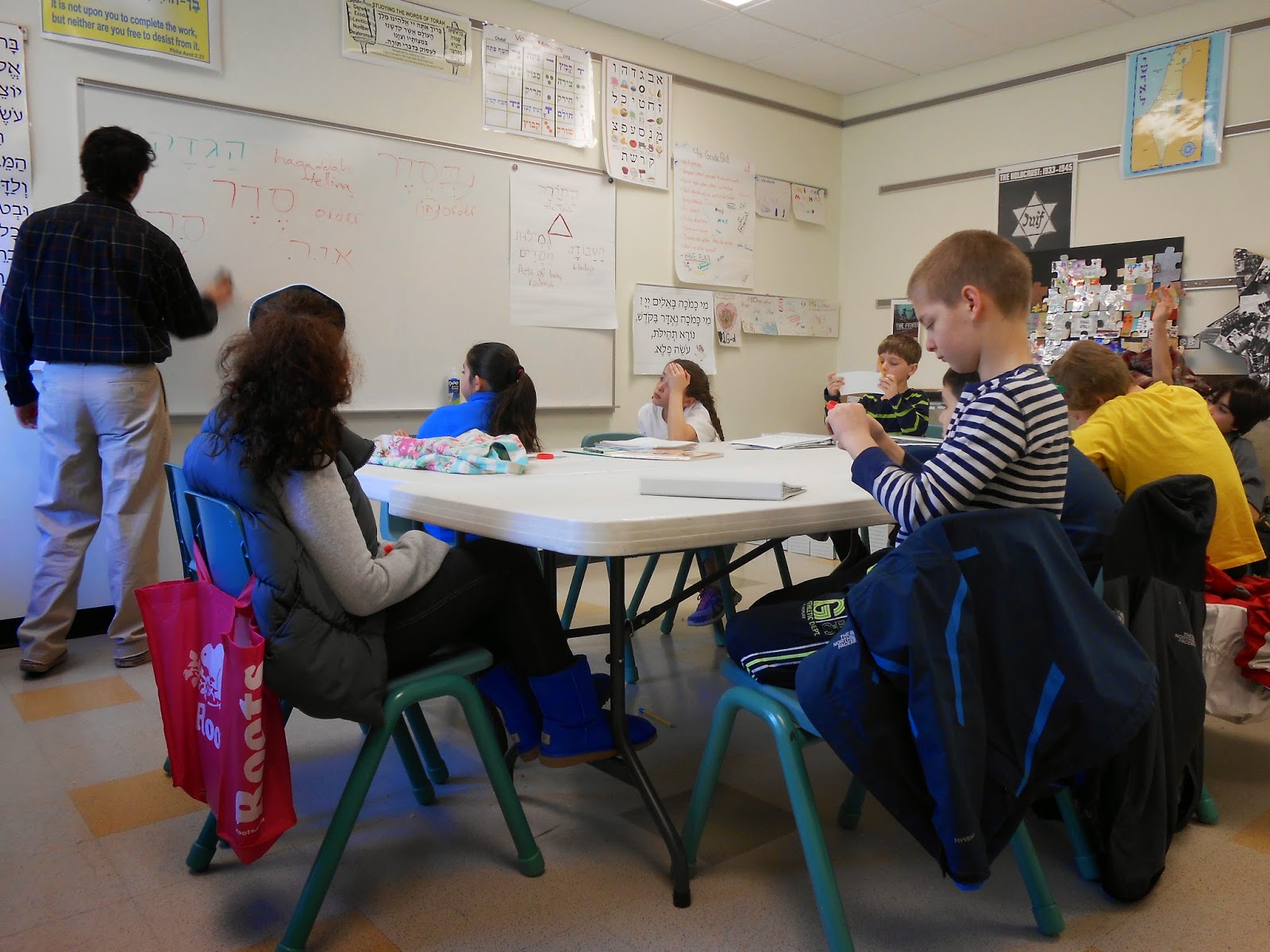Grade 3
To
start our class, we joined with the Grade 4 students. A volunteer from the Ronald McDonald House came to talk to us about what the Ronald McDonald House does and how the pop tabs that we have been collecting help to raise money for Ronald McDonald House, so that they can continue providing lots of wonderful services for families whose children are sick.
A lot of us had questions about what it is like to stay at Ronald McDonald House. We were very interested in the game room and technology room!
In Hebrew with Mrs. Zaas, we learned about the Hebrew months. Did you know that we started a new month on Friday night? It's now Nisan!
In Nisan, we celebrate the chag (holiday) Pesach (Passover). In case, we not only learned about Pesach, but we got to enjoy some Pesach foods, like matzah and charoset. We
learned how the recipe for charoset
is different depending on what country it is being made in. We also found out
how charoset represents the mortar
that the Jewish slaves used when they were building with bricks.
Grade 4
To start our class, we joined with the Grade 3 students. A volunteer from the Ronald McDonald House came to talk to us about what the Ronald McDonald House does and how the pop tabs that we have been collecting help to raise money for Ronald McDonald House, so that they can continue providing lots of wonderful services for families whose children are sick.
A lot of us had questions about what it is like to stay at Ronald McDonald House. We
were very interested in the game room and technology room!
Then, in Hebrew with Mr. Stone, we discussed the
upcoming holiday, Pesach (Passover). Mr. Stone taught us some new words that follow the
roots that we have already learned that also relate back to the holiday. One of
these words was "b’seder." This is an adjective and it means to be in order.
Seder means order in the larger sense. Then we listed some of the annual
traditions, such as what goes on the seder plate. Some examples include: a
shankbone (zeroah), parsley (karpas), hard-boiled egg (beitzah), charoset, and matzah. A newer tradition
that has been rising in the Reform movement would placing an orange on the seder table. Legend had it that it was once said that women would be on the bima when an orange is on the seder plate, so in honor of the role of women in Reform Judaism, so homes have added an orange to the seder plate! Other traditions also include: singing
songs, eating a festive meal, and hiding the afikomen.
Grade 5
In T’filah, we learned that Cantor is away in New York this weekend, so the madrachim and Rabbi led the service. We talked about how "Modeh" means we are thanking God and also agreeing with God. Once we finished
saying our prayers, we discussed the upcoming holiday, Pesach. It’s in two weeks,
and we also talked about what we do during Pesach, as well as why we celebrate
it.
Next
we had Kehillah. Since the Cantor wasn't here, Mr. Solomon helped lead us in HaTikvah and Havdallah. We also celebrated March birthdays.
Grade
5 had art today! While talked about Pesach in general, mainly focused on Elijah and
Miriam. We then decorated wine glasses for Elijah or water glasses for Miriam.
Back
in class we began with a warm up. The warm up consisted of a timed reading,
where we read 3 given lines of Hebrew words in 20 seconds. Once that was done,
we went in the workbook to our new unit to learn the story behind V'shamru. We
then began to decipher the vocabulary from the prayer in our workbooks.
Grade 6
Today in Mr. Solomon’s class we reviewed the Ma Nishtanah for Pesach. Some people say that they there are four questions, some say that there are five questions, and some say that it is one question with four answers! We went around the
table and tackled it word by word. To do this, Mr. Solomon designed an activity where we each got a word, but they weren't in order. First, we read the word to ourselves. Then, we read the word to our neighbor. Then, we found our word in the Ma Nishtanah. THEN, we read it word by word out loud, each of us reading our word when we got to it. After a few rounds, some of us volunteered to try reading the whole thing! With continued practice, we will definitely be ready come seder time.
In Mrs. Potash’s class we continued talking about G’milut Chasadim, or Acts of Loving Kindness. We specifically focused on environmental Tikkun Olam and some activities we can do outside of TEE to promote taking care of the environment. As a class, we went around the room and talked about some activities we already do with our families and schools to help the environment. One the main topics touched on was recycling. Mrs. Potash also found some Jewish texts to help reiterate the importance of the environment and its connection to Judaism.

















No comments:
Post a Comment